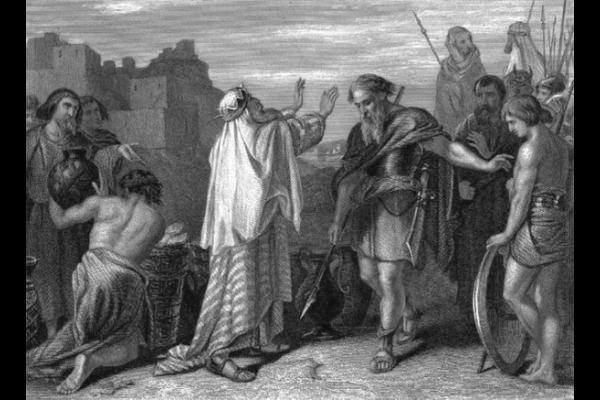Question
Dear Gramps,
I follow the Word of Wisdom but my husband who converted to the Mormon Church before we got married is having a hard time with the fact that it is used to determine who is worthy to enter the temple. The Word of Wisdom states that it “IS NOT BY COMMANDMENT NOR CONSTRAINT.” So if God himself said it is not commanded… and not by constraint (which in my head means it is not prohibited) then how is it that we are able to tell a man or woman she is evil for putting something into their body that God himself has warned us against, but not made a sin? Didn’t Joseph Smith smoke a tobacco pipe? Didn’t we use wine for sacrament? Also, if our sacrament blessings are to be said word for word, then why has the word “wine” been changed to “water”? doesn’t this void the blessing?
If we have an unchanging God, then why would He reveal one thing to us and then change it later? Aren’t we told that the Book of Mormon is gospel doctrine, so why are we being taught something that goes against the words in it? I want to be able to explain this to my husband, but I don’t understand it myself.
Christina
Answer
Dear Christina,
Let’s see if we can address your concerns one by one. First, is the Word of Wisdom a commandment or a suggestion? Of course it was given not by commandment or constraint, but rather by revelation and the word of wisdom, showing forth the order and will of God in the temporal salvation of all saints in the last days–
Those words come from the Eternal God of heaven and earth. If He deigns to give counsel to his children, not as a strict commandment, but as wise counsel, which shows forth his will for the temporal salvation of his children, could anyone blithely ignore that counsel and feel that he was in tune with his God, or in any way obedient to him? Our Father in Heaven gave other related counsel in these words—
Verily I say, men should be anxiously engaged in a good cause, and do many things of their own free will, and bring to pass much righteousness;
For the power is in them, wherein they are agents unto themselves. And inasmuch as men do good they shall in nowise lose their reward.
But he that doeth not anything until he is commanded, and receiveth a commandment with doubtful heart, and keepeth it with slothfulness, the same is damned (D&C 58:27-29).
Consistent with the implications of those scriptures, in a general conference of the Mormon Church held in 1851, President Brigham Young proposed to the general conference of the Church that all Saints formally covenant to keep the Word of Wisdom. This proposal was unanimously upheld by the membership of the Church. Since that day, the revelation has been a binding commandment on all Church members.
Therefore, since the Word of Wisdom was accepted by a vote of the members of the Church to be binding upon the Church, it is perfectly in order that obedience to that doctrine be treated in the same manner as any other doctrine of the Church, and thus be a requirement for entrance into the temple and for significant church callings. It would be inconsistent for a person to go to the temple and there make sacred covenants to obey all the laws of the gospel while not obeying the Word of Wisdom, since it has been formally accepted as binding on the Church.
Secondly, did Joseph Smith smoke a pipe? I have no idea whether he did or did not. However, the Word of Wisdom was not given, and that not by commandment until February of 1833. So if any members of the Mormon Church smoked a pipe before then, we would be hard put to take him to task for something that had not yet been revealed.
Thirdly, why has the use of wine in the sacrament of the Lord’s supper been changed to water, and would not such a change be in violation of the revealed word to use wine?
The use of wine in the sacrament was given by revelation from the Lord in April 1830, when the Church of Jesus Christ of latter-day Saints was formally organized—
It is expedient that the church meet together often to partake of bread and wine in the remembrance of the Lord Jesus (D&C 20:75).
However, new wine, or unfermented grape juice, was not always available, and so in August of that year the same Lord, Jesus Christ gave further instructions to the saints, recorded in the 27th Section of the Doctrine and Covenants, as—
For, behold, I say unto you, that it mattereth not what ye shall eat or what ye shall drink when ye partake of the sacrament, if it so be that ye do it with an eye single to my glory–remembering unto the Father my body which was laid down for you, and my blood which was shed for the remission of your sins.
Wherefore, a commandment I give unto you, that you shall not purchase wine neither strong drink of your enemies;
Wherefore, you shall partake of none except it is made new among you; yea, in this my Father’s kingdom which shall be built up on the earth (D&C 27:2-4).
Therefore, when new wine of their own make was not available, water was used to represent the blood of the Lord when taking the sacrament. And of course that is the standard practice of today. So since it was the Lord Himself who gave the instructions to change from wine to water, how could that possibly void the blessings associated with the sacrament or change its significance in any way?
Fourth, if we have an unchanging God why would he reveal one thing to us and then change it later? God is indeed unchanging in his love for us, and in his desire for our best welfare. But if He were to make a pronouncement and then never change it regardless of changing circumstances, He would show Himself to be an uncaring God, demanding obedience to his word even though conditions had changed so as to make such obedience both impractical and wrong. Remember how the entire gospel was changed because of the great atoning sacrifice of the Savior. The Lord said—
And ye shall offer up unto me no more the shedding of blood; yea, your sacrifices and your burnt offerings shall be done away, for I will accept none of your sacrifices and your burnt offerings.
And ye shall offer for a sacrifice unto me a broken heart and a contrite spirit. And whoso cometh unto me with a broken heart and a contrite spirit, him will I baptize with fire and with the Holy Ghost… (3 Nephi 9:19-20).
So let us exercise the faith to be obedient to the word of God as given in the holy scriptures or as revealed by those whom He has called as prophets, seers and revelators in our own day to guide and direct us in the way of life and salvation.
Gramps







